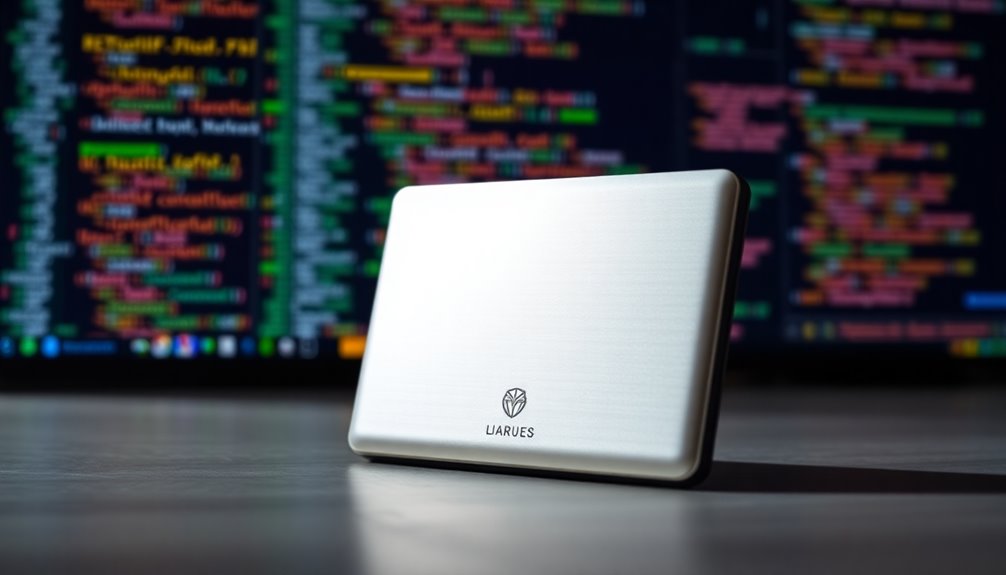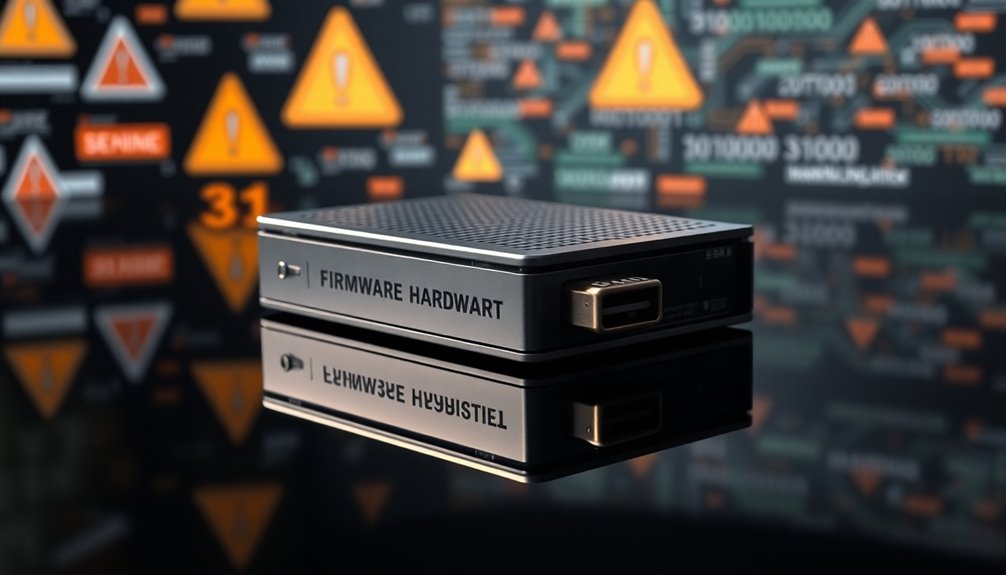A hardware wallet is a secure device that stores your cryptocurrency private keys offline. This means you're protected against online threats like hacking. With features like a recovery phrase, you can regain access to your funds if the device is lost or damaged. You'll have full control over your keys, adhering to the principle that "not your keys, not your crypto." While it's highly secure, using a hardware wallet may feel less convenient for regular transactions. If you're curious about how it compares to other wallets or the latest security updates, there's plenty more to uncover.
Key Takeaways
- A hardware wallet is a physical device designed to securely store private keys offline, protecting them from online threats.
- It supports multiple cryptocurrencies, allowing users to manage various assets in one place.
- Transactions are signed directly on the device, keeping private keys isolated from computers and mobile devices.
- Users can recover lost or damaged wallets using a recovery phrase, typically consisting of 12-24 words.
- Regular firmware updates and security features like PIN protection ensure ongoing protection against vulnerabilities and attacks.
Key Features Overview

When it comes to securing your cryptocurrency, hardware wallets stand out due to their unique features.
These physical devices store your private keys offline, providing a secure way to store your digital assets. By keeping your keys in cold storage, you significantly reduce the risk of hacking and theft compared to online wallets.
Most cryptocurrency hardware wallets support multiple cryptocurrencies, allowing you to manage various assets seamlessly. A vital security feature is the recovery phrase, which lets you recover your funds if the device is lost or damaged.
Additionally, you must connect the hardware wallet to a computer or mobile device to sign transactions, ensuring your private keys remain isolated from online vulnerabilities and protecting access to your funds.
Understanding Crypto Asset Security

As you navigate the world of cryptocurrency, understanding crypto asset security is crucial for protecting your investments. A hardware wallet offers enhanced security by storing your private keys offline, making it a safe option for managing your crypto assets.
Unlike software wallets, which can be vulnerable to online threats, hardware wallets ensure that your private keys remain secure. You maintain full control over your keys, embodying the principle of "not your keys, not your crypto."
To bolster security, use features like PIN protection and recovery seed phrases for backup. Regularly update your wallet's firmware and securely store your recovery seed offline to further safeguard your assets. Additionally, consider the importance of using trusted custodians for IRA management, as they can provide expert advice and help you navigate regulations and compliance.
This proactive approach to fund management can help protect your digital wealth effectively.
Secure Key Storage Mechanism

A hardware wallet's secure key storage mechanism significantly enhances the protection of your crypto assets. By storing your private keys offline, it drastically reduces exposure to online threats and malware.
The device utilizes a Secure Element chip, which ensures tamper-proof security, keeping your keys isolated from potential hacking attempts. You can sign transactions directly on the hardware wallet without ever exposing your private keys to your computer or mobile device.
In case your device is lost or damaged, the recovery seed—a 12 to 24-word phrase—enables you to regain access to your funds. Regular firmware updates and security features like PIN protection and two-factor authentication further fortify the secure key storage, ensuring your assets remain safe and sound.
Pros and Cons Overview

While hardware wallets offer exceptional security for your crypto assets, they come with both advantages and disadvantages.
On the plus side, hardware wallets allow you to store your crypto while keeping your private key offline, which significantly protects your private information from online threats. This secure self-custody gives you peace of mind, as you maintain full control over your assets and the ability to send cryptocurrency without relying on third-party custodians.
However, the initial cost can deter some users, especially beginners, and they may be less convenient for frequent transactions due to the need for a physical connection.
Hardware vs. Software Wallets

When deciding between hardware and software wallets, it's crucial to understand their fundamental differences in security and convenience.
Hardware wallets, or cold wallets, store private keys offline, greatly enhancing security against online threats like phishing attacks. They require a physical connection for transactions, making them less convenient for frequent use.
In contrast, software wallets provide quick access and ease of use but store private keys on devices or in the cloud, exposing them to malware and cyber attacks.
If you prioritize long-term storage and security for your digital assets, hardware wallets are your best bet. However, if you need immediate access for regular transactions, software wallets might suit you better, despite the risks involved.
Firmware Vulnerabilities in Wallets

Understanding firmware vulnerabilities in hardware wallets is essential for ensuring your digital assets remain secure.
If you don't regularly update your wallet's firmware, outdated software may expose your private keys to attackers. These individuals can exploit vulnerabilities to execute malicious code, leading to unauthorized access to your funds.
Some wallets use a secure element chip to enhance security, adding an extra layer of protection against such threats.
To mitigate risks, always download firmware updates directly from the official manufacturer's website. Additionally, consider wallets with open-source firmware, as regular community audits can help identify and address vulnerabilities, ultimately enhancing your wallet's security.
Stay proactive about updates to protect your assets effectively.
Emergence of Biometric Security

As cybersecurity threats evolve, hardware wallets are adopting advanced methods to secure user access, with biometric security emerging as a leading solution.
By utilizing unique human characteristics like fingerprints and facial recognition, biometric security enhances authentication and provides an additional layer of security. This integration ensures that only authorized users can access their private keys and execute transactions.
With the sophistication of cyber threats increasing, many modern hardware wallets now incorporate biometric sensors, allowing you to unlock your device using your fingerprint instead of traditional PIN codes.
This approach significantly reduces the risk of unauthorized access, as biometric traits are unique and hard to replicate, making your hardware wallet even more secure against potential attacks.
Regularly Update Firmware

Regularly updating your hardware wallet's firmware is essential for maintaining robust security. Firmware updates often include crucial patches for vulnerabilities that hackers could exploit, ensuring your cryptocurrency assets remain safe.
To enhance functionality and support for new cryptocurrencies, manufacturers frequently release these updates. As a user, you should check for available updates through your hardware wallet's official software interface or website.
When updating, you may need to connect your wallet to a computer and enter a PIN to prevent unauthorized access. Keeping your firmware updated not only protects your assets but also guarantees compatibility with evolving technologies and standards in the cryptocurrency space.
Don't overlook this vital step in securing your digital investments!
Frequently Asked Questions
What Are the Disadvantages of Hardware Wallets?
When considering hardware wallets, you'll notice some disadvantages.
They often come with a higher upfront cost, which might make you hesitant. The setup can be tricky, especially if you're not tech-savvy, and you might find the physical connection inconvenient for frequent trading.
If you lose the wallet without a secure backup, you could lose your funds permanently. Plus, keeping up with maintenance and firmware updates is an extra responsibility you'll need to manage.
What Is the Difference Between a Digital Wallet and a Hardware Wallet?
The main difference between a digital wallet and a hardware wallet lies in security and accessibility.
Digital wallets, always online, allow quick access for transactions but expose you to hacking risks.
In contrast, hardware wallets store your private keys offline, providing enhanced security for your assets.
While digital wallets offer convenience for everyday use, hardware wallets are ideal for long-term storage, ensuring your cryptocurrencies remain safe from online threats.
Are Hardware Wallets 100% Safe?
Think of hardware wallets as a sturdy vault for your digital treasures.
While they offer solid security, they're not foolproof. You can still face risks like theft or loss, and a compromised recovery phrase could unlock your funds for anyone.
To keep your assets safe, regularly update firmware, buy from trusted sources, and consider extra security measures like passphrases.
Does My Crypto Still Grow in a Hardware Wallet?
Yes, your crypto can still grow while stored in a hardware wallet.
The value of your assets fluctuates based on market conditions, not the type of wallet you use.
As long as you keep your private keys secure, you maintain full control over your cryptocurrencies.
When you decide to sell or trade, that's when you realize any appreciation in value, independent of how you store your digital assets.
Conclusion
In conclusion, if you want to keep your crypto assets safer than a dragon guarding gold, a hardware wallet is your best bet. Its secure key storage and protection against online threats make it a superior choice over software wallets. Sure, there are pros and cons, but the peace of mind it provides is priceless. Just remember to regularly update your firmware and consider biometric security for an extra layer of protection. Your digital fortune deserves it!









